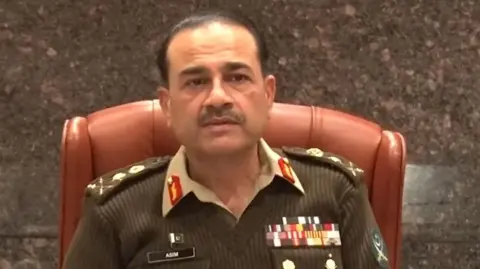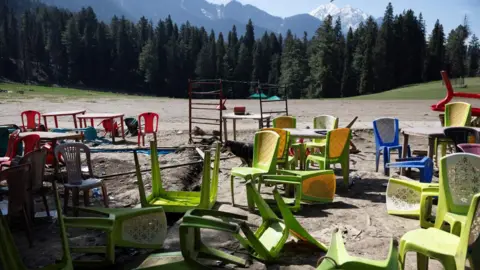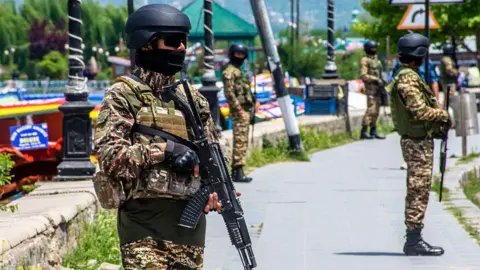Pakistan army chief's Kashmir remarks cause anger in India
 Getty Images
Getty ImagesPakistan's army chief, General Asim Munir, is not known for seeking the spotlight.
Yet in recent weeks, it has found him - not only in Pakistan, but across the border in India and in diplomatic capitals far beyond.
His remarks on Kashmir - made just days before a militant attack in Indian-administered Kashmir which killed 26 people - have reignited a debate over Pakistan's military stance and its role in rising regional tensions.
Kashmir, which India and Pakistan claim in full but administer only in part, has been a flashpoint between the countries since they were partitioned in 1947.
Though not directly linked to the violence, Gen Munir's words have been dissected and interpreted as a shift towards a more confrontational tone, both from him and the institution he leads.
He is viewed as the most powerful man in Pakistan, where the military has long been blamed for interfering in politics, installing and removing governments. As tensions with India rise again, he is being watched as the central figure in a volatile nuclear-armed rivalry.
So who is Gen Munir? And what drives him?
 ISPR/X
ISPR/XGen Munir, who is in his late 50s, is the son of a school principal and religious scholar. He joined the army through the Officers Training School in Mangla in 1986, earning the prestigious Sword of Honour given to the best-performing cadet. He was then commissioned into the 23 Frontier Force Regiment.
Over nearly four decades, Gen Munir has commanded troops along Pakistan's sensitive northern borders near Kashmir, led its intelligence services and served in Saudi Arabia to bolster defence ties.
He holds a masters degree in public policy and strategic security management from the National Defence University in Islamabad and is also an alumnus of military institutions in Japan and Malaysia.
I first saw Gen Munir in Islamabad in 2023, at a packed hotel hall filled with ministers, diplomats, generals and journalists. Dressed in civilian clothes, he moved with calm authority, scanning the room as he approached the podium.
He opened his speech with a recitation from the Quran, reflecting his rare status as a hafiz - someone who has memorised Islam's holy book in its entirety - among Pakistan's military elite.
In person, Gen Munir seemed soft-spoken and polite. On stage, he was stern, with the sharp gaze of a former spymaster. A man trained to watch, listen and wait. Now, his words are echoing beyond Pakistan.
Gen Munir became Pakistan's chief of army staff in November 2022, stepping into the role amid a perfect storm of political upheaval, an economic crisis and public disillusionment with the military's role in governance.
His appointment followed months of speculation, largely because of his fallout with the then-prime minister Imran Khan.
Gen Munir had served just eight months as the chief of Pakistan's Inter-Services Intelligence (ISI) spy agency before being removed by Khan in what many believe was a deeply personal and political move - though both sides deny this. That moment remains a turning point in their relationship.
Today, Khan is serving a sentence in jail and Gen Munir is the most powerful man in the country.
Gen Munir is regarded by many commentators as differing in temperament and approach from his immediate predecessor, Qamar Javed Bajwa.
Gen Bajwa was more public-facing, supported backchannel diplomacy with India and handled a major escalation of tensions between the countries in 2019 with caution.
Under what came to be known as the "Bajwa Doctrine", he increasingly emphasised regional stability and geo-economics alongside traditional security priorities.
After a suicide bomb attack on troops in Indian-administered Kashmir at Pulwama in 2019, Gen Bajwa oversaw Pakistan's military response to Indian air raids but refrained from escalation, returning Indian pilot Abhinandan Varthaman and helping avert a full-blown war.
"Bajwa was clear," says Abdul Basit, senior fellow at Singapore's S Rajaratnam School of International Studies.
"He had diplomatic channels open and was managing multiple fronts like Kashmir, Afghanistan and the US withdrawal from Afghanistan with pragmatism," he said, adding that Gen Munir "is under immediate, intense pressure to act".
"He has come in with unfinished business to stabilise the country's security situation internally… The problems he faces (rising terrorism, political instability, an economic crisis, regional tensions) are urgent and worsening. He cannot afford long, drawn-out strategies like his predecessor Bajwa could. He needs quicker, firmer responses - both at home and abroad."
 Reuters
ReutersThe dispute over Kashmir is an issue that no Pakistani military leader can appear weak on, observers say.
"Kashmir is Pakistan's national security interest - every child in Pakistani schools is taught this," political and defence analyst Amir Zia told the BBC, adding: "It's a basic understanding here that we cannot give India any leverage."
Last week's attack was the deadliest on civilians in Indian-administered Kashmir in two decades and led to India accusing Pakistan of supporting the attackers, charges Islamabad denies. There are fears India will respond with military action.
Since he took over, Gen Munir has mostly not spoken in public, but one pivotal speech has gained widespread attention.
On 17 April, he told a meeting of expatriates in Islamabad "we are different from Hindus" in every possible way.
He doubled down on Kashmir, calling it Pakistan's "jugular vein", and vowed Pakistan would "never abandon Kashmiris in their heroic struggle against Indian occupation".
The speech might have remained one of many ideological statements made by Pakistani leaders over the years except for what happened next.
Just five days later, on 22 April, militants opened fire on tourists in Pahalgam in Indian-administered Kashmir.
"This was not standard rhetoric," says Joshua T White, a South Asia expert at Johns Hopkins University.
"While the substance aligns with Pakistan's ideological narrative, the tone - especially its direct invocation of Hindu-Muslim differences - made it particularly inflammatory."
"Coming just before the Pahalgam attack, it has badly complicated any effort by Pakistan to claim restraint or pursue backchannel diplomacy," he adds.
Mr Basit agrees the optics were damaging: "He [Munir] may have been caught up in the moment. He said things that, in a private setting, may not have raised eyebrows but on that public platform, as army chief, they came across as overtly confrontational."
"Some saw it as a power move," says Mr Basit.
"It felt like his arrival moment. A declaration that he's now firmly in control, that Pakistan's direction is once again in the army's hands," he adds.
Gen Munir made another speech earlier in the year, which some think may signal he is adopting a harder line than his predecessor. Speaking in Muzaffarabad on Kashmir Solidarity Day on 5 February, he declared: "Pakistan has already fought three wars for Kashmir, and if 10 more wars are required, Pakistan will fight them."
But given the timing, it's his latest speech that has fuelled speculation after the Pahalgam attack, with Indian officials hinting at a link. Though no evidence has been presented so far, the rhetoric has deepened mistrust.
 Getty Images
Getty ImagesAt home, Gen Munir's actions are being seen by many as those of a leader who is calculated, uncompromising and determined to reassert military authority.
After the 9 May 2023 riots sparked by Khan's arrest, Gen Munir launched an unprecedented crackdown on his supporters.
Civilians were tried under military laws, a top general was forced into early retirement, and former ISI chief Lt Gen Faiz Hameed (retired), once close to Khan, was arrested.
Critics called it a purge of Khan loyalists; supporters saw it as restoring discipline to Pakistan's powerful military whose authority – and that of Bajwa and Munir – had been challenged. The two men were being heavily criticised in public.
Gen Munir is just over two years into his five-year term, but the contours of his legacy are already taking shape.
Whether the simmering crisis with India escalates into a larger military stand-off or is tackled through diplomacy, the future of Pakistan's relationship with its neighbour may well hinge on which direction Gen Munir steers it in.
Mr Basit warns the next few weeks "will determine how things unfold".
"How Gen Munir navigates this crisis will define him as a soldier, as a power broker, and what kind of regional actor Pakistan wants to be. And right now, that choice sits largely with him."
Follow BBC News India on Instagram, YouTube, Twitter and Facebook.
